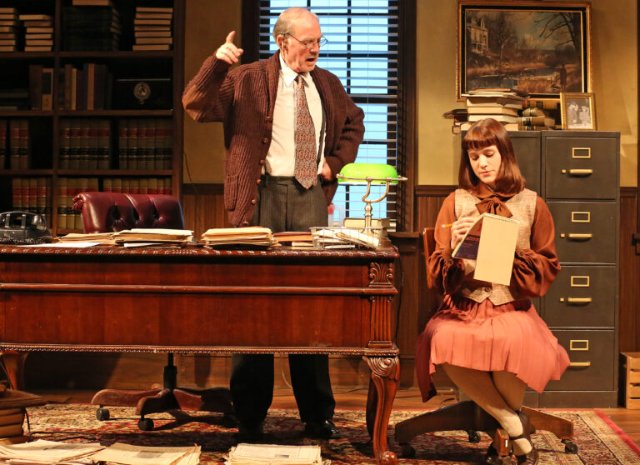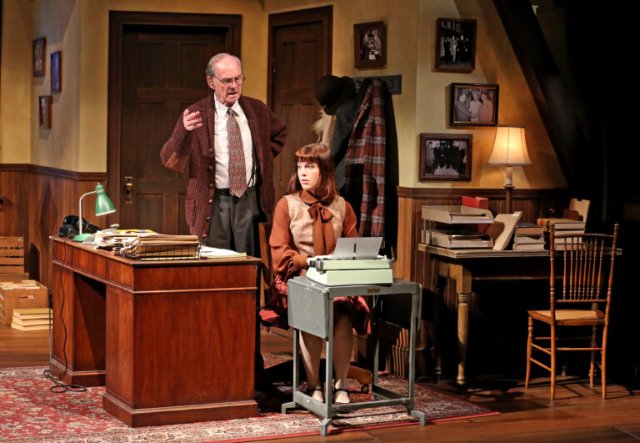Trying in South Florida
Palm Beach Dramaworks in West Palm Beach
By: Aaron Krause - Jun 03, 2024
If you look closely at the program for Palm Beach Dramaworks’ (PBD) polished and poignant production of the touching historical drama, Trying, you’ll notice a tilted “g.” This occurs not only on the program’s front cover, but inside.
Possibly, the slanting letter symbolically suggests that we, as a society, are also slightly off kilter. Surely, one thing we need to work on is getting along with those different from us. Undoubtedly, we can learn from individuals such as former U.S. Attorney General Francis Biddle (under President Franklin D. Roosevelt) and Biddle’s former secretary, Joanna McClelland Glass.
In Trying, which is onstage at PBD in its intimate space through June 9 in a two-and-a-half-hour production, Glass writes about her experiences as Biddle’s secretary toward the end of his life. The play takes place from November 1967 through June 1968 in Georgetown, Washington D.C.
The two real-life characters were different in several respects. For instance, Biddle was more than 50 years older. Also, while Biddle (1886-1968) was a patrician from Philadelphia, Glass is a commoner from the Canadian prairie.
In this production, which Producing Artistic Director William Hayes smartly directs, PBD veteran Dennis Creaghhan portrays Biddle with impressive naturalism. Meanwhile, PBD newcomer Kelly McCready delivers a nuanced and convincing performance as Sarah Schorr, a fictional stand in character for Glass.
Directing wise, Hayes, who paces the production well and stages it effectively, also ensures the journey from tension and mistrust to respect and fondness unfolds gradually and convincingly. It’s a slow journey, sort of like the one we as a society need to make to mend wounds. While Hayes directed the production, David A. Hyland is listed as assistant director.
Although Trying may not be 100-percent historically accurate, it is a moving, honest, and humorous two-and-a half-hour play.
PBD first staged Trying during the professional, nonprofit company’s 2006-07 season. In his program notes, Hayes writes that he decided to revive the play because it’s “about a lost skill these days: the art of communication.”
Indeed, think about it: We send instant messages using shorthand (LOL, for instance) on technological devices, and those messages often lack thought, sensitivity, or nuance. Of course, we expect instant responses and immediate gratification. Meanwhile, in person, instead of communicating civilly, we often shout at each other, curse, and disagreements often lead to violence and tragedy. And we rarely truly listen to one another.
Of course, we’re living during a trying time, and that’s one reason why the play’s title is significant and timely. It’s also an appropriate title because it describes the action of the two characters.
“We spent our months together trying to negotiate and span our enormous differences of youth and age, class and culture,” Glass wrote in an introduction to her script.
In addition, the play is a heartfelt meditation on aging and life’s fragility without getting too morbid. In fact, humor in just the right places helps to offset the play’s darkness.
“It’s as if my mind excuses itself without permission,” Biddle tells his secretary regarding his memory lapses. Further, his state of mind rests “somewhere between lucidity and senility.”
At another point, Biddle says, “I’m in the process of leaving this life. The exit sign is flashing over the door and the door is ajar.”
Speaking of life and death, the fact that Schorr is about to have a baby just as Biddle is near death is an apt and vivid symbol of the life cycle.
Truly, Biddle’s accomplishments in life are impressive to say the least. For instance, in addition to serving as U.S. Attorney General under FDR, he was chief justice of the American Military Tribunal at Nuremberg. But while we might admire Biddle’s accomplishments, his irritability and insults directed at his secretary can turn us against him. Fortunately, Glass includes details about the character that reinforce his humanity. In addition, Biddle’s moments of vulnerability and regret make him more of a sympathetic character.
Acting wise, Creaghan imbues his performance with impressive spontaneity. Truly, each grunt, spoken word, gesture, move, facial expression, and utterance of pain sounds and looks fresh.
With a head of grey hair and a slight grey mustache, Creaghan, as Biddle, stands with his back hunched. He often looks down, holds on to a desk, and his glasses appear on the bridge of his nose. The character’s struggle to form words seems as real as Biddle’s limping and slow movement. In fact, you are shocked when the actor comes out during the curtain call. He moves vibrantly, even dances energetically, looking nothing like the character with halting movement.
Meanwhile, McCready, a dark-haired young actor with a fresh face that suggests purity, finds layers in her performance as Schorr. The performer radiates vitality and lends Schorr believable eagerness and a sense of serenity.
While McCready’s Schorr may appear green and naïve, the performer makes her character assert herself forcefully when she needs to. Clearly, she is a woman of strong convictions. Also, a melancholy expression forms on Schorr’s face at appropriate times. She leans into Biddle, as though she urgently wants to connect with him. And she clearly listens to him, just as Biddle eventually listens to his secretary.
A shortcoming is that McCready’s Canadian accent could use work. To her credit, the performer says the word “sorry” with a believable Canadian accent (the “o” pronounced like “orange”), but the actor’s pronunciation of other words, such as about, sound American. However, that is nitpicking considering that McCready hails from Australia. Without a doubt, she has deftly disguised an Australian accent for this production.
Behind the scenes, scenic designer Bert Scott has created a detailed period, spacious set to stand for Biddle’s office. With books neatly arranged on shelves, papers piled onto a desk, and the space mostly immaculate, we get the sense that a proud, busy man who cares about appearances works there. The space is inviting, with dark brown walls and other pieces of furniture, as well as yellowish walls with portraits on them, period details, and patterned rugs. Meanwhile, outside the window, it looks as though snow is really falling.
Lighting designer Addie Pawlick helps to focus the performers, and her realistic lighting also sets moods.
In addition, behind the scenes, costume designer Brian O’Keefe has clothed the performers mostly in outfits that suggest the 1960s. On the other hand, one curious choice involves outfitting Biddle with a pocket watch, which began to fall out of style for men around World War I when wristwatches became more popular.
But overall, this is a triumphant production. And with its winning effort in its re-mounting of Trying, PBD’s triumphant 2023-24 season closes. Next up is Neil Simon’s tender and funny Pulitzer Prize winning play, Lost in Yonkers, to kick off the 2024-25 season, the company’s 25th. More details about the upcoming season appear on www.palmbeachdramaworks.org.
IF YOU GO
WHAT: Trying, by Joanna McClelland Glass.
WHEN: Through Sunday, June 9. Remaining performances are 2 p.m. Wednesday, 2 and 8 p.m. Saturday, as well as 2 p.m. Sunday.
WHERE: 201 Clematis St. in West Palm Beach.
TICKETS: Go to https://tickets.palmbeachdramaworks.org/TheatreManager/1/login?event=471.


